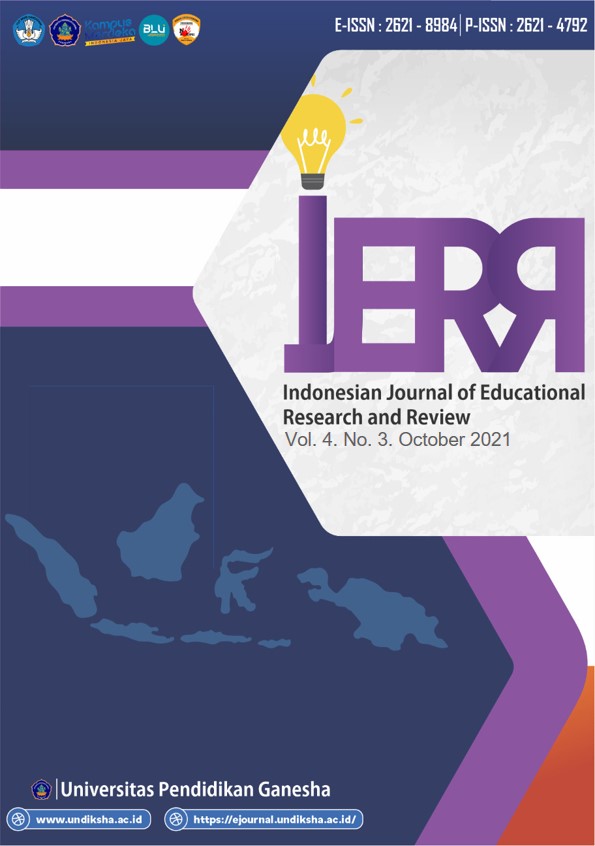Extent at Which Vocational Guidance Influence Career Decision of Vocational and Technical Students
DOI:
https://doi.org/10.23887/ijerr.v4i3.41634Keywords:
Extent, Vocational Guidance, Influence, Career Decision, Vocational And Technical Students, Class LevelAbstract
Personal guidance centers on problems of personality, physical and emotional development, interpersonal relations and similar matters. But vocational guidance given to students may or may not influence their career after graduation. This study thus examined extent at which vocational guidance influence career decision of vocational and technical students. This is a descriptive research design of the survey type. 220 technical students were sampled all technical education students in Ilorin metropolis. Frequency count and mean were used answer the research questions and Hypothesis was tested with t-test at 0.05 level of significance. The findings established that vocational guidance has been able to influence career decision making of vocational and technical education students to a high extent. Also, there was no significant difference in the impact of vocational guidance on career choice of junior and senior vocational and technical education students. It was therefore recommended that Vocational and Technology Education students should be exposed to the importance of guidance services and what counseling is all about in order for them to make good career decisions.
References
Anwana, U. I. (1989). An analysis of occupational preferences of farm five students in secondary schools in. Cross River State Education, 3(1), 32–38.
Aspen, T., Cooper, R., Liu, Y., Marowa, M., Rubio, C., Waterhouse, E. J., & Sheridan, J. (2015). What secondary schools advisors in New Zealand know about pharmacy and how that knowledge affects students career choice. American Journal of Pharmaceutical Education, 79(1). https://doi.org/10.5688/ajpe79107.
Ayçiçek, B. (2020). Investigation of the Students’ Opinions on Vocational Guidance Services Conducted at High Schools. International Online Journal of Education and Teaching, 7(3), 827–842. https://eric.ed.gov/?id=EJ1258463.
Bedi, P., Goyal, S. B., & Kumar, J. (2021). Applied Classification Algorithms Used in Data Mining During the Vocational Guidance Process in Machine Learning. Inventive Systems and Control, 137–146. https://doi.org/10.1007/978-981-16-1395-1_11.
Crișan, C., Pavelea, A., & Ghimbuluț, O. (2014). A Need Assessment on Students’ Career Guidance. Procedia - Social and Behavioral Sciences, 180, 1022 – 1029. https://doi.org/10.1016/j.sbspro.2015.02.196.
Egbo, J. O., & Okifo, J. (2015). Guidance and counselling: a creativity for promoting sustainable well-being and adjustment of secondary school students in Nigeria. British Journal of Education, 3(10), 49–57.
El Haji, E., Azmani, A., & El Harzli, M. (2018). Using the FAHP Method in the Educational and Vocational Guidance. International Journal of Modern Education & Computer Science, 10(12).
Ezeji, S. C. (2014). Guidance and Counselling in Education. Chulbson International Press.
Ferguson, S. L., & Hull, D. M. (2019). Exploring science career interest: Latent profile analysis of high school occupational preferences for science. Journal of Career Development, 46(5), 583–598. https://doi.org/10.1177%2F0894845318783873.
Gargalianos, S., Makridis, G., Tsiaka, D., & Kalaitzidou, D. (2021). Student Views on Vocational Guidance: Findings on Chronic Deficits-Suggestions to Meet Students Needs. RAIS Journal for Social Sciences, 5(1), 73–78. http://journal.rais.education/index.php/raiss/article/view/144.
Haug, E. H., Plant, P., Valdimarsdóttir, S., Bergmo-Prvulovic, I., Vuorinen, R., Lovén, A., & Vilhjálmsdóttir, G. (2019). Nordic research on educational and vocational guidance: a systematic literature review of thematic features between 2003 and 2016. International Journal for Educational and Vocational Guidance, 19(2), 185–202. https://doi.org/10.1007/s10775-018-9375-4.
Igberaharha, O. C., & Oroka, O. V. (2012). Fundamentals of Vocational Technical Education in Nigeria. Masega Publisher.
Jiang, Y. (2018). Explorations of Improvements in Vocational Guidance Course for College Students Driven by Innovation and Entrepreneurship Education. 2018 4th International Conference on Economics, Social Science, Arts, Education and Management Engineering (ESSAEME 2018), 280–286.
Ogundele, A. G. (2013). The place of technical Education towards skill acquisition to National development. IOSR Journal of Research and Method in Education (IOSR-JRME), 3(5), 73–76. https://www.academia.edu/download/70125127/The_Place_of_Tech_edu.pdf .
Oranu, R. N. (2013). Problem of Vocational and Technical Education in Nigeria. Conference on Vocational and Technical Education.
Sahin, M. (2010). Blended learning in vocational education: An experimental study. International Journal of Vocational and Technical Education, 2(6), 95–101. https://doi.org/10.5897/IJVTE.9000007.
Seyi, D. (2014). An overview of Vocational and technical education in Nigeria under secondary school system. International Journal of Technology Enhancements and Emerging Engineering Research, 2(6), 119–122. http://citeseerx.ist.psu.edu/viewdoc/download?doi=10.1.1.443.8876&rep=rep1&type=pdf.
Turganbayev, Y., Adilgazinov, G., Barabanova, Y., Zhakupov, A., & Zhukibayeva, G. (2021). Information System for Vocational Guidance, Employment and the Forecasting of Labor Demand: The Case of Kazakhstan. 2021 IEEE International Conference on Smart Information Systems and Technologies (SIST), 1–6.
Umeano, E. C. (2012). Perceived Parent-Youth Relationship and its Socio- Psychological Implications for Students: The Case of University of Nigeria, Nsukka. Nigerian Journal of Empirical Studies in Psychology and Education, 1(5), 22–29.
Verawadina, U., Jalinus, N., & Widya, R. (2020). Needs Assessment of E-Learning Vocational Education. 11(4), 262–274.
Wordu, C. C., Igweagbara, S. N., Borden, S. U., & Akue, N. P. (2013). The Relevance of Vocational Guidance in Vocational Technical Education Training Programme in Nigeria. Journal of Technology and Vocational Educators, 3(1), 62–67.
Young, L. U. (2017). The role of guidance counsellors in the career in the career development of adolescent and young adult with special needs. British Journal of Arts and Social Sciences, 2(1), 51–62.
Downloads
Published
How to Cite
Issue
Section
License
Authors who publish with the Indonesian Journal of Educational Research and Review (IJERR) agree to the following terms:
- Authors retain copyright and grant the journal the right of first publication with the work simultaneously licensed under a Creative Commons Attribution License (CC BY-SA 4.0) that allows others to share the work with an acknowledgment of the work's authorship and initial publication in this journal.
- Authors are able to enter into separate, additional contractual arrangements for the non-exclusive distribution of the journal's published version of the work (e.g., post it to an institutional repository or publish it in a book), with an acknowledgment of its initial publication in this journal.
- Authors are permitted and encouraged to post their work online (e.g., in institutional repositories or on their website) prior to and during the submission process, as it can lead to productive exchanges, as well as earlier and greater citation of published work. (See The Effect of Open Access)












